Putin ‘could use NUCLEAR weapons in Ukraine if Zelensky retakes Crimea’: Military expert warns Vladimir will dismiss the consequences of exploding a nuke if he faces humiliation
Vladimir Putin could resort to using nuclear weapons in his war against Ukraine if the Russian despot senses his troops are facing defeat on the battlefield, a retired US Army brigadier general has warned.
Kevin Ryan, chief of staff of the military's Space and Missile Defense Command, said nuclear war is a “completely viable” option for Putin if Ukrainian forces make gains on the battlefield and even retake conquered territory such as Crimea.
Ryan, who also served as defense attaché to Russia, said Moscow is not only at war with Ukraine, but also with the West – and that it is for this reason that Putin is much more likely to see the use of tactical nuclear weapons as “prudent deterrence.” '.
“Exploding a nuclear weapon in Ukraine may seem like 'overkill' in a war against Ukraine, but in a war against the West it can be seen as a sensible deterrent,” Ryan told MailOnline.
“The bottom line is that using a nuclear weapon is entirely feasible and the negative consequences can be ignored if the alternative is defeat.”
He says that if Ukrainian forces start making gains on the battlefield, Putin and his military leaders will not be concerned about the prospect of irradiating territory within their occupied territories with tactical nuclear weapons.
These nuclear weapons can have a yield of up to 100 kilotons – five times the amount of the American atomic bombs dropped on Hiroshima and Nagasaki in 1945.
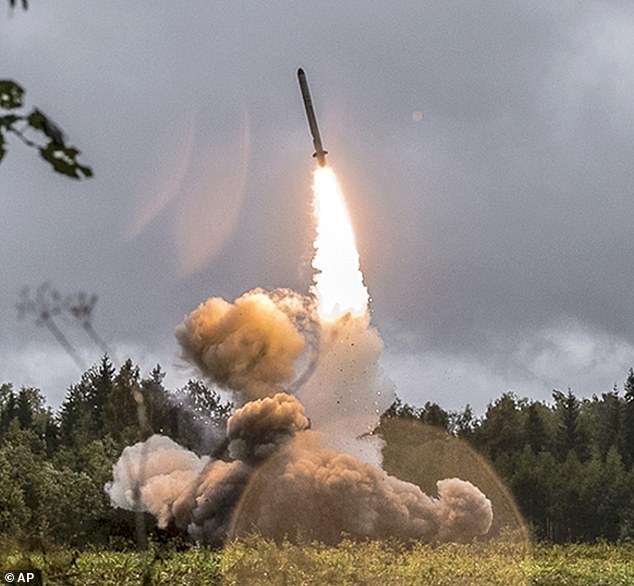
A Russian Iskander-K missile launched during a military exercise at a training area at the Luzhsky Range, near Saint Petersburg, Russia, in 2017
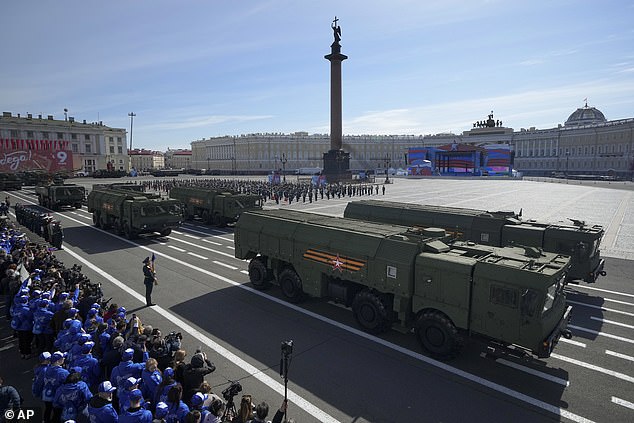
Kevin Ryan, chief of staff of the military's Space and Missile Defense Command, said nuclear war is a “completely viable” option for Putin if Ukrainian forces make gains on the battlefield and even retake conquered territory such as Crimea. In the photo: Iskander rocket launchers
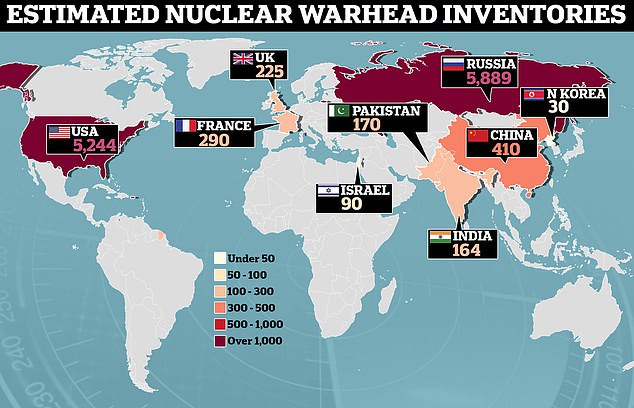
“As far as irradiating territory within their occupied territories, I think Russia's leaders would weigh that against losing a war — or against losing Crimea or a large part of their own military,” Ryan said . “That's not a bad trade for Russia in those cases.”
Ryan says the only reason Putin has not yet deployed tactical nuclear weapons in Ukraine is because Kiev's long-awaited counteroffensive is stalling ahead of a second winter.
Ukrainian soldiers have failed to make significant gains against Russian forces entrenched in captured territory during their counter-offensive, and casualties on both sides – now in the hundreds of thousands – continue to rise.
“The only reason we haven't seen tactical nuclear weapons is because Ukraine's counteroffensive has not been as successful as hoped,” Ryan said.
Putin has warned since launching his all-out invasion of Ukraine that Moscow is prepared to use “all available means” to repel attacks on Russian territory deemed existential – a reference to its nuclear arsenal.
Russia is believed to have about 2,000 tactical nuclear weapons – compared to America's 100 – including bombs that can be carried by aircraft, warheads for short-range missiles and artillery shells.
The tactical nuclear weapons are intended for battlefield use and have a short range and low yield compared to much more powerful warheads mounted on long-range missiles capable of destroying cities.
Moscow sees them as a way to offset NATO's strength in advanced conventional weapons since the Cold War.
“While the West has relied more on conventional weapons since the end of the Cold War, Russia has had to continue to rely on tactical nuclear weapons to be prepared to achieve battlefield objectives,” Ryan said.
“This is largely because Russia has failed to satisfactorily modernize its conventional forces.”
“The bottom line is that Russian military leaders view tactical nuclear weapons as a valid and useful escalation tool,” Ryan said. “That also applies to Putin.”
Russia has raised the threshold for the use of nuclear weapons in its security doctrine in recent years – from “situations of critical importance to the national security of the Russian Federation” in 2000 to the more precise “aggression associated with the use of conventional weapons when the survival of the state is threatened in 2014.
For Putin, that would mean the loss of territory such as Crimea, which in turn would threaten the despot's position of power.
And Ryan warned that Ukraine is just “the first battlefield” of Putin's war with the West, pointing out how Putin is preparing Russia for a “bigger conflict” with the move of troops and nuclear weapons to Belarus.
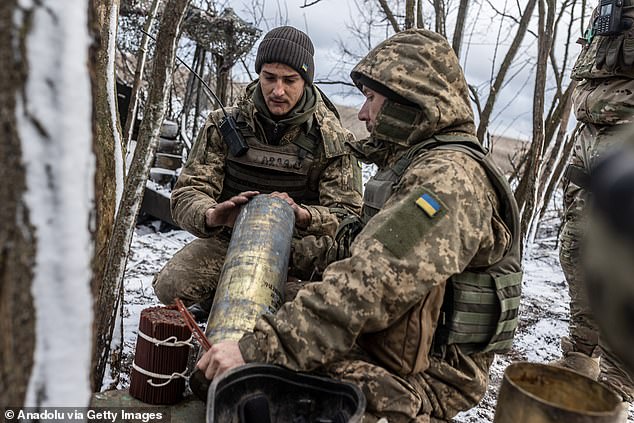
Ukrainian soldiers of the 57th Brigade prepare the explosive artillery attack, in their combat position, towards Kupiansk in Kharkiv Oblast, Ukraine, on November 27
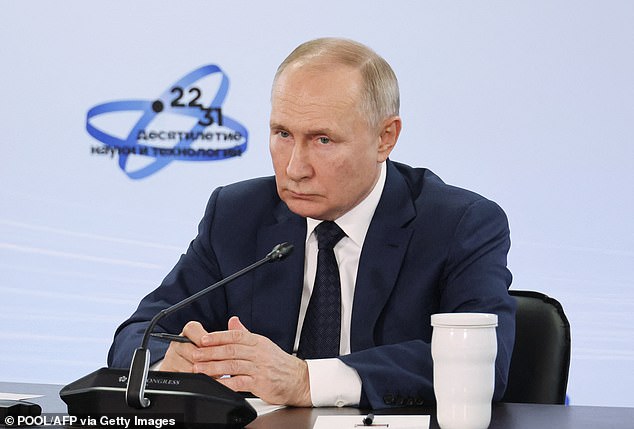
Ryan, who also served as defense attaché to Russia, said that Moscow is not only at war with Ukraine, but also with the West – and that it is for this reason that Putin (pictured on November 29) is much more likely to use tactical tactics to see. nuclear weapons as 'prudent deterrence'
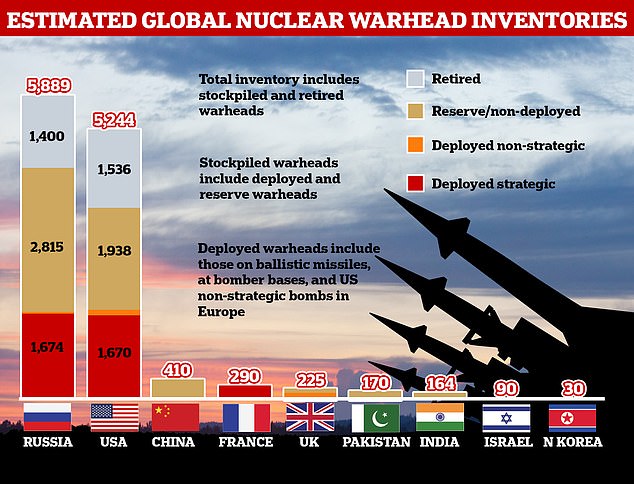
Officials in Moscow and Minsk have said the warheads sent to Belarus could be carried by Belarusian Su-25 ground-attack jets or mounted on short-range Iskander missiles.
“The West is not yet fully aware of the reality that we are at war with Russia,” Ryan said. 'Countries like Poland and the Baltic states believe Putin's words and actions and think we are at war.
'But the US, Britain and much of NATO? I think they believe this is just a war between Russia and Ukraine – a war we can help in from the sidelines.”
The deployment of tactical nuclear weapons in Belarus, which has a 1,000-kilometer border with Ukraine, will ensure that Russian aircraft and missiles can reach potential targets there more easily and quickly if Moscow decides to use them.
It would also expand Russia's ability to attack several NATO members in Eastern and Central Europe with its tactical nuclear weapons, which Belarusian President Alexander Lukashenko has said were about five times more powerful than the US nuclear bombs fell on Hiroshima and Nagasaki in 1945.
“Ukraine is the first battlefield of Putin's war with the West,” Ryan warned. “There are indications that Russia is preparing for a bigger conflict than what is happening in Ukraine.”
He pointed out how Putin has ordered his military to expand to more than 1.5 million active-duty troops by 2026, increased his military budget to $109 billion by 2024 and moved troops and nuclear weapons to neighboring Belarus.
“This suggests that Putin is doing more than just compensating for losses in his 'Special Military Operation' in Ukraine,” Ryan said.
Putin and his cronies have been warning for months that the war in Ukraine could turn into a nuclear war. The Russian despot warned in June that “there will be no winners, including America” in a Third World War.
Putin said in a thinly veiled threat: “The United States pretends not to be afraid of an escalation of the conflict in Ukraine, but sensible people there clearly do not want to take this into a Third World War.
“In the event of a Third World War there will be no winners, including America.”
And earlier this year, Dmitry Medvedev, deputy head of Russia's Security Council, warned that attempts by Ukraine to regain control of Crimea in its counter-offensive were a “threat to the survival of the Russian state” – something that could call a nuclear response justifies under the country's pressure. safety doctrine.
“Every day we supply Western weapons to Ukraine brings the nuclear apocalypse closer,” Medvedev said at the time.
Ukrainian military analysts have said Putin's aim is to discourage Ukraine's Western allies from supplying Kiev with more weapons during their counter-offensive by using “nuclear blackmail.”
But Ryan says the West must supply Ukraine with more weapons so Kiev can achieve a “decisive” victory over Russia. To that end, Ryan says Ukraine should join NATO so that the nation – and the West – can achieve their goals of a Ukraine that is “sovereign and free.”
“We need a Ukraine that is part of NATO and the EU as a bulwark against the malign actions of a Russia under the control of Putin and his cronies,” Ryan said.
'The goals [of Ukraine being sovereign and free] will not be won at the negotiating table,” he adds. “They must be enforced by Ukraine and the West and protected with military force.”
“We should not delay Ukraine's admission to both NATO and the EU,” Ryan emphasized. “If we fail to achieve our goals against the Russia we face today, we will come under harder pressure to achieve them against the Russia Putin is building.”
